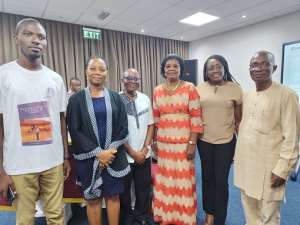
Mr. Ken Kinney, President of the West Africa Action Network on Small Arms and Light Weapons (WAANSA-Ghana), has revealed that the laws and regulations that currently govern small arms and light weapons acquisition and usage in the nation are antiquated and insufficient to manage the new trends in weaponry.
As a result, the WAANSA Ghana President has urged the government to pass the National Small Arms Bill 2023 into law to establish a strong legal framework and curb the spread of small arms and light weapons in the nation, which have sadly ended up in the wrong hands and are being used in conflict zones, particularly in the north.
Mr. Kinney made these revelations in Accra on Friday during a media encounter and dinner aimed at strengthening their ability to advocate for and campaign for legal reforms in the country. The country forms part of the Saving Lives Entity (SALIENT) Fund, a United Nations funding facility.
The SALIENT Fund Project is located within the UN Peacebuilding Fund, which is dedicated to supporting member states in tackling armed violence and illicit small arms and light weapons as part of a comprehensive approach to sustainable security and development.
SALIENT responds to the multi-faceted nature of the illicit proliferation of small arms and light weapons and addresses root causes of armed violence.
The project is implemented under the leadership of the UN Resident Coordinator, by UN Agencies (UNDP and UNODC) working in collaboration with the Government of Ghana, notably the National Commission for Small Arms, the Kofi Annan International Peacekeeping Training Centre, and the West African Action Network on Small Arms (WAANSA) to integrate small arms control into development frameworks.
The WAANSA President stated that to reduce the illegalities of these lethal weapons in Ghana and throughout the West African area, appropriate regulation of small arms and light weapons was required.
He expressed sorrow that the bill’s passage into law had taken so long and highlighted the necessity of the media’s vigorous campaigning.
Controlling SALW is still a crucial developmental issue that calls for a strong regulatory framework in order to address arms governance concerns effectively and save lives.
He noted that WAANSA-GHANA was committed to ensuring that all key stakeholders understand the need for the enactment of a legal framework to control the proliferation of small arms and light weapons and ammunition in the country, as it had been given an exclusive role within the SALIENT project to lead in advocacy.
Additionally, Mr. Kinney used the occasion to thank the several people and organisations that helped make the interaction with the media possible.
“I think the media will be better equipped to assist or join the CSOs in advocating and lobbying for the Arms Commission Bill to become law by the end of this engagement,” he said.
Mr. Johnson Asante-Twum, Managing Director of the International Action Network on Small Arms (IANSA), bemoaned the fact that there was currently no cap on the quantity of weapons that a qualified individual could possess, stating that it “gives the individual the room to build an armoury in his house without infringing on any law.”
“Once more, there was no legally permitted competency training facility for a person who purchased a weapon,” he stated and stressed that, in light of technological and developmental advancements, it was risky to license a weapon without also licensing the owner or providing training for its handling.
Mr. Asante-Twum noted, “We cannot do that with this kind of antiquated law; it’s like using 1962 and 1972 laws to fight a 2025 crime.”
He noted that to address the problems in Ghana’s arms and ammunition industry, a strong arms control system and a more powerful regulator were required, which is why the National Small Arms Bill 2023 had to be passed.
“We must appropriately regulate the system; if we don’t regulate and permit unrestricted access to weapons, you never know what will happen tomorrow,” the IANSA Managing Director stated.
The media engagement and dinner were to enhance journalists’ understanding of the National Small Arms Bill 2023 and its implications, improve the quality and accuracy of reporting on small arms and light weapons, foster collaboration and coordination among journalists, policymakers, and stakeholders, and promote advocacy and awareness-raising on the importance of the passage of the National Small Arms Bill 2023.
It was to improve the quality and accuracy of reporting on Small Arms and Light Weapons (SALW) proliferation, and the bill and project, increase public awareness and engagement on the issues surrounding SALW proliferation, and the importance of the bill and project.
It was also to enhance collaboration between the media, civil society organizations, and government agencies in promoting the implementation of the bill and project, and ensure the sustainable impact of promoting peace and security in Ghana and the West African region.


